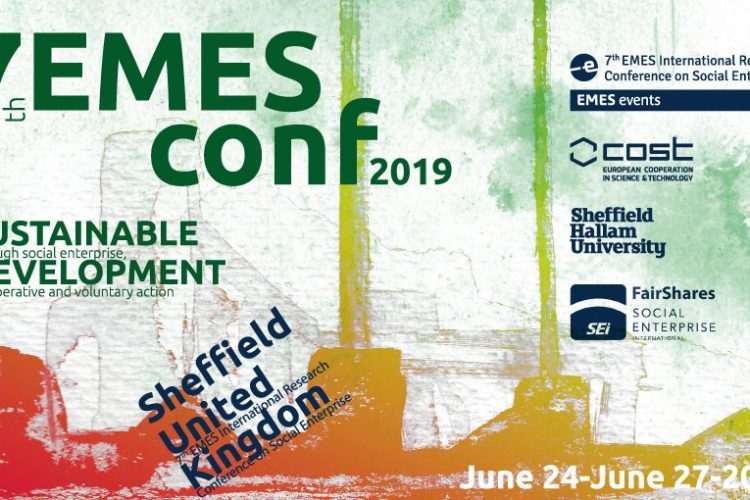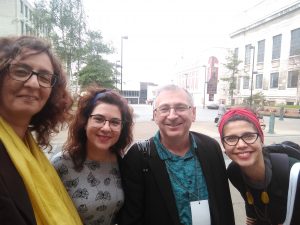 O Projeto TIMES participou na 7th EMES International Research Conference on Social Enterprise, “Sustainable development through social enterprise, co-operative and voluntary action”, organizada pela EMES – International Research Network, em parceria com o FairShares Institute for Cooperative Social Entrepreneurship (FSI) e o Centre for Regional Economic and Social Research (CRESR) nos dias 24 a 27 de julho na Sheffield Hallam University. As conferências da EMES são um dos principais pontos de encontro do mundo para todos os/as investigadores/as envolvidos/as no estudo de empresas sociais, empreendedorismo social, economia social e solidária de todo o mundo.
O Projeto TIMES participou na 7th EMES International Research Conference on Social Enterprise, “Sustainable development through social enterprise, co-operative and voluntary action”, organizada pela EMES – International Research Network, em parceria com o FairShares Institute for Cooperative Social Entrepreneurship (FSI) e o Centre for Regional Economic and Social Research (CRESR) nos dias 24 a 27 de julho na Sheffield Hallam University. As conferências da EMES são um dos principais pontos de encontro do mundo para todos os/as investigadores/as envolvidos/as no estudo de empresas sociais, empreendedorismo social, economia social e solidária de todo o mundo.
A equipa do TIMES apresentou 3 trabalhos:
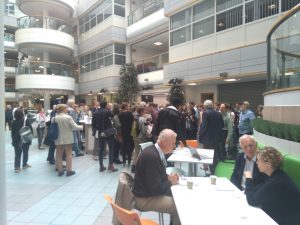
Social enterprise contested boundaries in Portugal: inside an outside the social and solidarity economy, Silvia Ferreira (University of Coimbra, Portugal)
Resumo
In the recent years there has been a broad consensus and a high political activism from governments and key social actors around the concept of social economy, expressed in the institutionalization of a social economy sector through the Framework Law of the Social Economy and the advisory body National Council for the Social Economy, support bodies such as CASES, and programmes, its statistical recognition through the Satellite Account and the recently created Social Economy Confederation. This 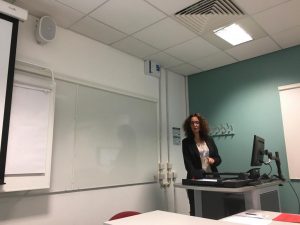 structuration was interpreted (Ferreira, 2015) as a shifting of the driving force of the third sector in Portugal, from the axis TS/welfare state to the axis TS/economy, as a result of changes in both the TS and its political coalitions’ strategies and in the broader context and institutional framework of the welfare state in retrenchment. We argue that the current debate on social enterprises in Portugal is part of this institutional shift.
structuration was interpreted (Ferreira, 2015) as a shifting of the driving force of the third sector in Portugal, from the axis TS/welfare state to the axis TS/economy, as a result of changes in both the TS and its political coalitions’ strategies and in the broader context and institutional framework of the welfare state in retrenchment. We argue that the current debate on social enterprises in Portugal is part of this institutional shift.
The debate around the concept of social enterprise amongst the variety of key actors, from the academia, the organisational fields, government and businesses exhibits a split inside the axis economy/TS, which indicates different trends and conceptions of the economic and its relation with the role of the state in welfare, including different representations of the meaning of the “social” and of “enterprise”.
The current debates may also be framed historically, in the evolution of the meanings of the concept of social enterprise. Since the 2000s, research in Portugal identified as social enterprises social cooperatives, social welfare non-profits, WISE and recently, businesses with social goals and social innovation oriented. Whereas the first three types refer to enterprises in the social economy sector – associations, cooperatives, mutual societies and foundations –, the latter mostly relates to commercial enterprises or disregards the relevance of the legal form. Thus, tendentially, the concept of social enterprise as social business 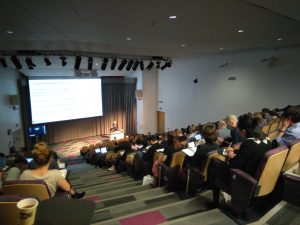 exists outside the social economy. This latter framework is embedded in a different institutional framework and actors’ coalitions than that of the social economy, including the flagship EU funded pilot programme Portugal-Social Innovation, business schools, foundations, consultants and infrastructure bodies organised discursively around concepts such as social entrepreneurship, social innovation, social ventures, high impact ventures, social investment, and so on.
exists outside the social economy. This latter framework is embedded in a different institutional framework and actors’ coalitions than that of the social economy, including the flagship EU funded pilot programme Portugal-Social Innovation, business schools, foundations, consultants and infrastructure bodies organised discursively around concepts such as social entrepreneurship, social innovation, social ventures, high impact ventures, social investment, and so on.
This presentation is based on data and analysis produced in the context of the project “Institutional Trajectories and Models of Social Enterprises” (TIMES), which aims at understanding social enterprises in Portugal. Supported by content analysis of semi-structured interviews to key actors and documental and legal analysis we describe the controversies and conflicts surrounding the different meanings of social enterprise produced within different institutional frameworks and actors’ coalitions. We map the different meanings of the “social” and the “enterprise” and the way these meanings are institutionalized in legal and policy frameworks.
The stalemate on the concept of social enterprise, expressed by the fact that whereas there is no legal framework for social enterprise while, at the same time, the concept is starting to appear in the public procurement legal framework and in operational programmes funded by the European Union, exhibits a characteristic that has been identified in Portugal, that is institutional heterogeneity/ambiguity and actors fragmentation so that no interest is able to become dominant.
Therefore, by describing the existing controversies and conflicts in the different meanings of social enterprise and its relation with the social economy, and the institutional frameworks and actors’ coalitions, we aim at identifying the tensions in the boundaries between the social and the economic, the attempts at redrawing these boundaries, and the possibilities that these boundaries become institutionalized under the concept of social enterprise.
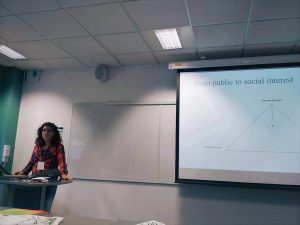 Trajectories and characteristics of social enterprise models in Portugal, Patrícia Moura e Sá (University of Coimbra) e Joana Almeida (Center for Social Studies)
Trajectories and characteristics of social enterprise models in Portugal, Patrícia Moura e Sá (University of Coimbra) e Joana Almeida (Center for Social Studies)
Resumo
From the existing literature and recent research, we can identify several models of social enterprises in Portugal given diverse institutional trajectories and different features in organizational economic, social and governance dimensions. Some of these models can also be identified in international literature (Defourny and Nyssens, 2017), with features marked by the specificities of the Portuguese context.
In this presentation we will characterize each model of social enterprise in Portugal, in relation to their trajectories and features. The work is based on literature review, interviews with key stakeholders and organisational case studies carried on under the project “TIMES — Institutional Trajectories and Social Enterprise Models in Portugal”
We identified five models, each with their specific discourses, social actors, privileged legal forms and frameworks, boundaries and industry fields: i) the entrepreneurial non-profit model, ii) the work integration social enterprise model, iii) the social cooperative model iv) the social solidarity social enterprise model and the v) and the more recent, widely EU driven social business model. Whereas models I to IV can be described inside the social economy, model V tends to spill over the social economy.
The social cooperative model, which finds parallels, for instance with the Italian social cooperative movement, has its origins in 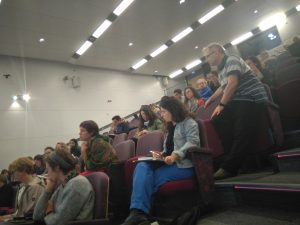 the Portuguese Democratic revolution and the revival of the cooperative movement. It rests in the setting up of multistakeholder cooperatives for people with disabilities and evolved for a specific social cooperative branch. It emphasises the entrepreneurial dimension of cooperatives, the aim of social integration as expression of social citizenship rights, and participation of all stakeholders in governance. The entrepreneurial non-profit model emerges from social services non-profits providing at the core of the welfare state in close cooperation with the state, recognised under a specific statute (private institutions of social solidarity), under a characteristically weak welfare state which depends on users’ fees for the majority of resources in these organisations. The work integration social enterprise, mostly with the case of a public policy of social insertion enterprises, in decline in most of the country after the end of the public policy, with the exception of Azores. The social solidarity social enterprise model, territorially oriented developing in the confluence of local development and social integration projects and organisations, including new cooperatives oriented to environment and sustainability issues and, finally, the newer social business model, shaped by frameworks on social entrepreneurship and social innovation, influenced by international and European frameworks and structured nationally around a new actors such as business schools, consultants, foundations and some public policies.
the Portuguese Democratic revolution and the revival of the cooperative movement. It rests in the setting up of multistakeholder cooperatives for people with disabilities and evolved for a specific social cooperative branch. It emphasises the entrepreneurial dimension of cooperatives, the aim of social integration as expression of social citizenship rights, and participation of all stakeholders in governance. The entrepreneurial non-profit model emerges from social services non-profits providing at the core of the welfare state in close cooperation with the state, recognised under a specific statute (private institutions of social solidarity), under a characteristically weak welfare state which depends on users’ fees for the majority of resources in these organisations. The work integration social enterprise, mostly with the case of a public policy of social insertion enterprises, in decline in most of the country after the end of the public policy, with the exception of Azores. The social solidarity social enterprise model, territorially oriented developing in the confluence of local development and social integration projects and organisations, including new cooperatives oriented to environment and sustainability issues and, finally, the newer social business model, shaped by frameworks on social entrepreneurship and social innovation, influenced by international and European frameworks and structured nationally around a new actors such as business schools, consultants, foundations and some public policies.
In these different trajectories we identify a double movement: one of organisations that are becoming more market-oriented in face of the welfare state retrenchment and the emergence of social investment actors and tools, and other from organizations increasingly oriented towards the common good/public interest faced with social/political pressure to become more democratic and/or socially responsible. These institutional trajectories demonstrate an adaptive capacity to different demands, redefining the boundaries between the state, the market and society.
References:
Defourny, J., & Nyssens, M. (2017). Fundamentals for an International Typology of Social Enterprise Models. ICSEM Working Papers, No. 33. Liège: The International Comparative Social Enterprise Models (ICSEM) Project.
The social enterprise ecosystem in Portugal: enabling and constraining factors influencing the development of different models of social enterprise, Hugo Pinto (Center for Social Studies) e Luara Maranhão (Center for Social Studies)
Resumo:
The concept of ecosystem refers to the entity formed by biotic communities that continuously inhabit and interact in a delimited 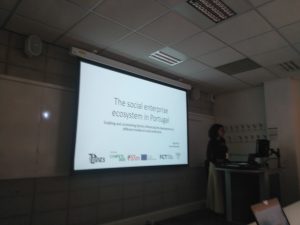 territory and by the abiotic factors that are present in these communities. The concept has been widely used in social sciences to analyse delimited contexts where actors develop specific activities. It is commonly linked to ideas coming from complexity theory, namely as complex adaptative systems exhibiting emergence characteristics, and evolution theories, with the emphasis in change, adaptation and selection.
territory and by the abiotic factors that are present in these communities. The concept has been widely used in social sciences to analyse delimited contexts where actors develop specific activities. It is commonly linked to ideas coming from complexity theory, namely as complex adaptative systems exhibiting emergence characteristics, and evolution theories, with the emphasis in change, adaptation and selection.
The concept of entrepreneurial ecosystems suggests a dynamic set of relationships, services and interdependencies that catalyse the creation, renewal and growth of firms. Considering that today value creation is associated not only with marketable products, goods and services, but with other offers that respond to existing needs that are not necessarily expressed in the market, either by demand-side constraints, as the lack of economic resources of potential users to engage in regular market exchange, either by supply-side limitations, as the low or difficult economic return by firms, the attention given to social enterprises in growing.
Social entrepreneurial activity is largely influenced by ecosystem conditions. We define a social entrepreneurial ecosystem as the set of evolving and interdependent actors and institutions that enable social enterprise generation and its activity – in a multitude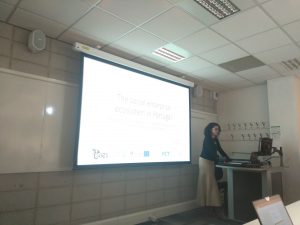 of types – within a particular territory.
of types – within a particular territory.
In this paper, we look to information from project “TIMES — Institutional Trajectories and Social Enterprise Models in Portugal” to provide a preliminary overview of the existing social entrepreneurial ecosystem components in Portugal. The Portuguese ecosystem for social enterprise assumes a hybrid structure that expresses a variety of policy schemes, networks and support structures oriented to diverse streams, to all enterprises, to the social and solidarity economy and specific to social enterprises.
In this ecosystem we identify governmental bodies and programmes, partnership bodies involving government and the social economy/social enterprises, infrastructure and certification bodies and labels, education and training institutions, learning platforms, research bodies, federative bodies and networks, intermediaries between social enterprises and public and business sector agents, financing institutions and programmes.
The social enterprise ecosystem in Portugal is diverse and structured around different models of social enterprises. We identify five models: i) the entrepreneurial non-profit model, ii) the work integration social enterprise model iii) the social cooperative model iv) the social solidarity social enterprise model and the v) and the social business model.
We will present a map of this ecosystem relating it to the different models and identify the spaces of intersection. Based on key stakeholders’ interviews and social enterprise case studies we will discuss how this diverse ecosystem enable or/and constrain the development of different social enterprise models.
Mais…
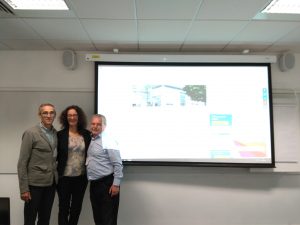 Esta participação teve também o apoio da COST Action EMPOWER-SE, através do qual também foi possível organizar o painel “Social enterprise and the social economy” que teve por objetivo comparar a relação entre a economia social e as empresas sociais em vários países, tema identificado como relevante na pesquisa desenvolvida no âmbito do TIMES.
Esta participação teve também o apoio da COST Action EMPOWER-SE, através do qual também foi possível organizar o painel “Social enterprise and the social economy” que teve por objetivo comparar a relação entre a economia social e as empresas sociais em vários países, tema identificado como relevante na pesquisa desenvolvida no âmbito do TIMES.
- Strengthening the social economy in Malta through a Social Enterprise Approach, Dr. Vincent Caruana, Centre for Environmental Education and Research, University of Malta
- Social enterprises in France and in Spain: between path dependence and institutional creation?, Prof. Marta Solórzano, Spanish National University of Distance Education, Prof. Francesca Petrella, Aix-Marseille University, Prof. Nadine Richez-battesti, Aix-Marseille University
- The Role of Social Entrepreneurs in Social Economy: a Case of Lithuanian Social Enterprises, Dr. Egle Butkeviciene, Kaunas University of Technology, Mrs. Audrone Urmanaviciene, Mykolas Romeris university
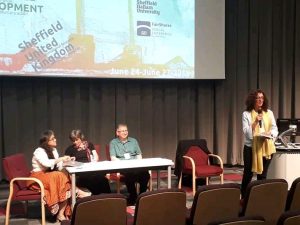
Sílvia Ferreira, participou também com Lars Hulgard (Universidade de Roskilde), na sessão do FETSE – Forum on Education and Training in Social Enterprise, no âmbito do Transdisciplinary Forum que antecede a conferência e como coorganizadora e moderadora da sessão de abertura da Conferência subordinada ao tema Can social enterprise be vehicles for sustainable development? , com as palestras de Rory Ridley-Duff, Sheffield Hallam University, Luciane Lucas dos Santos, Center for Social Studies, Coimbra University e Nadia Johanisova, Masaryk University.
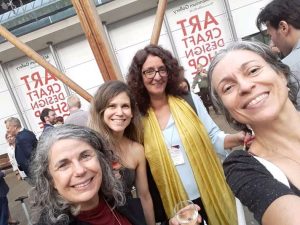 e mais…
e mais…
Mas o melhor de tudo foram mesmo os/as amigas encontrados/as e reencontrados/as, com uma presença significativa de amigos e amigas do Centro de Estudos Sociais e da Faculdade de Economia da Universidade de Coimbra, como Fabiane Bessa e Maíra Fajardo, que participaram na Pós-Graduação em Economia Social – Cooperativismo, Mutualismo e Solidariedade, da Faculdade de Economia da Universidade de Coimbra.
Maíra Fajardo, atualmente estudante de doutoramento da FEUC, sob orientação da investigadora do TIMES, Maria Elisabete Ramos apresentou o poster “What concept of social enterprise European Union (EU) is using in its legal framework?”.
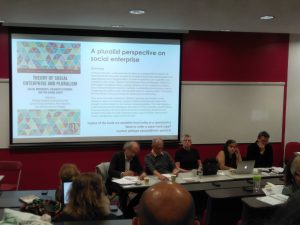
Michela Giovannini, bolseira Marie Curie com o projeto AGORA, no Centro de Estudos Sociais apresentou a comunicação “Solidarity economy organisations between economic and political mobilisations: insights from Barcelona”.
Luciane Lucas dos Santos, investigadora do Centro de Estudos Sociais, além da sua participação na sessão de abertura com uma palestra sobre “Feminisms, community economies and sustainable societies”, e participou na apresentação do livro de que é co-autora com Philippe Eynaud, Jean-Louis Laville, Swati Banerjee, Flor Avelino e Lars Hulgård “Theory of Social Enterprise and Pluralism: Social Movements, Solidarity Economy, and Global South“.

